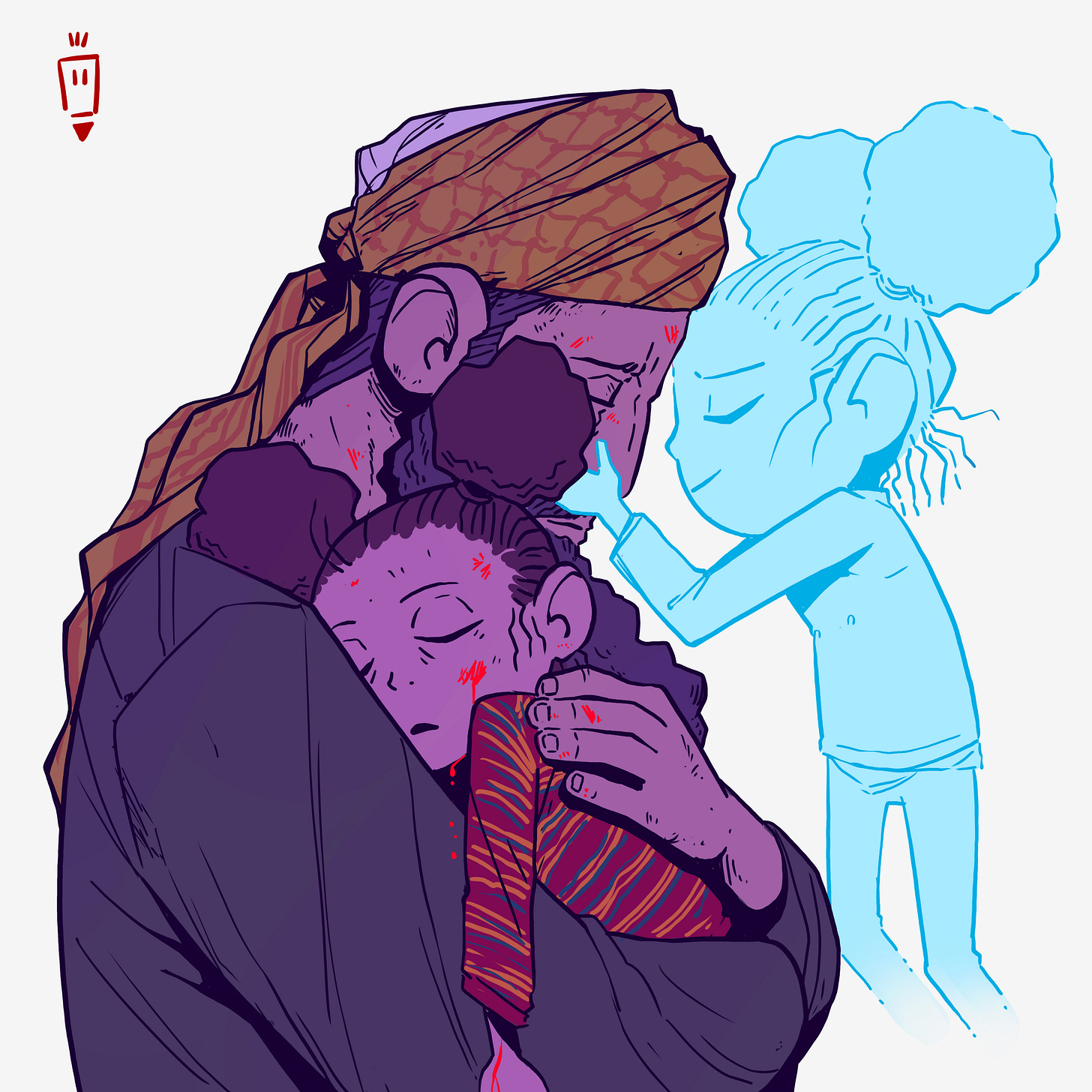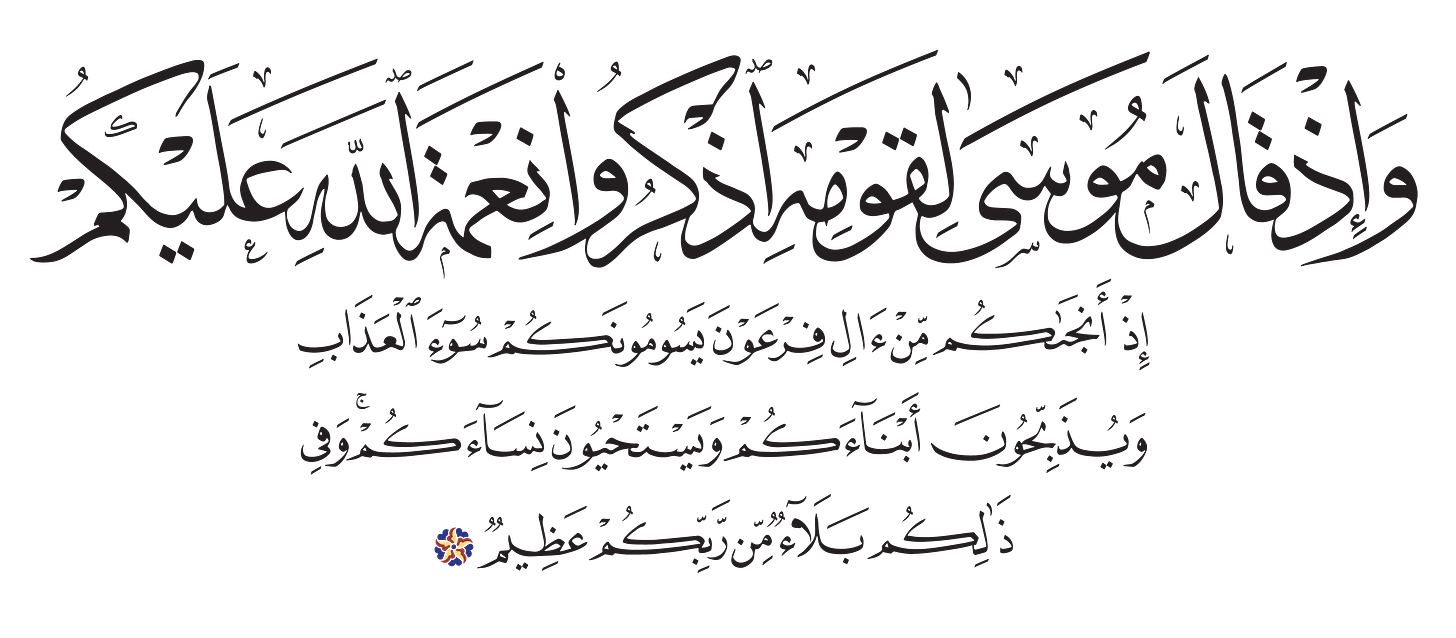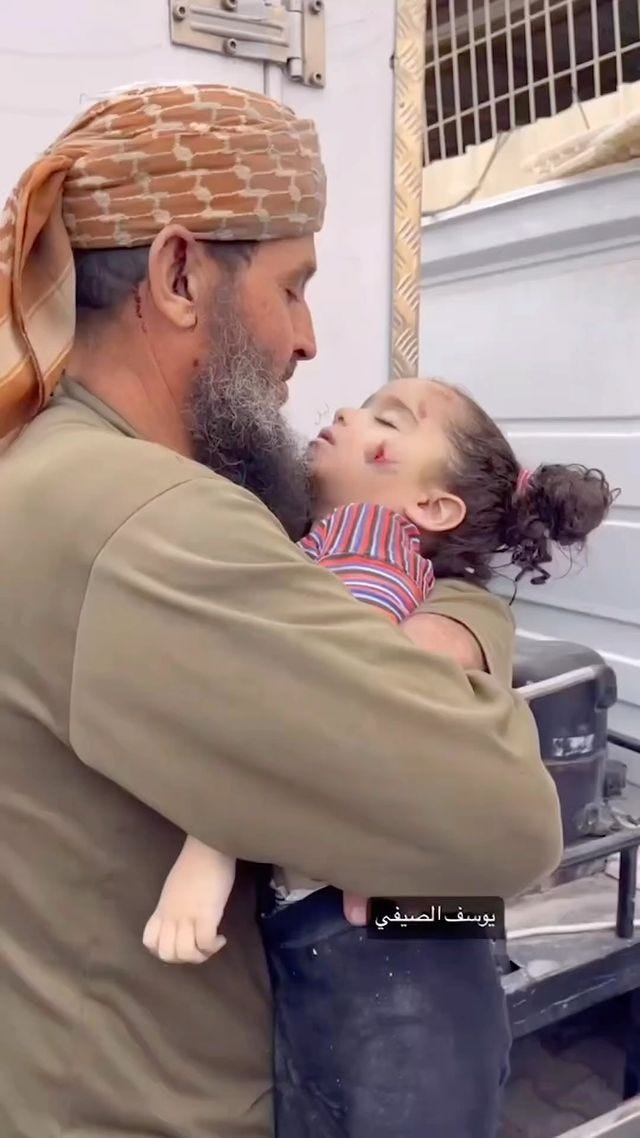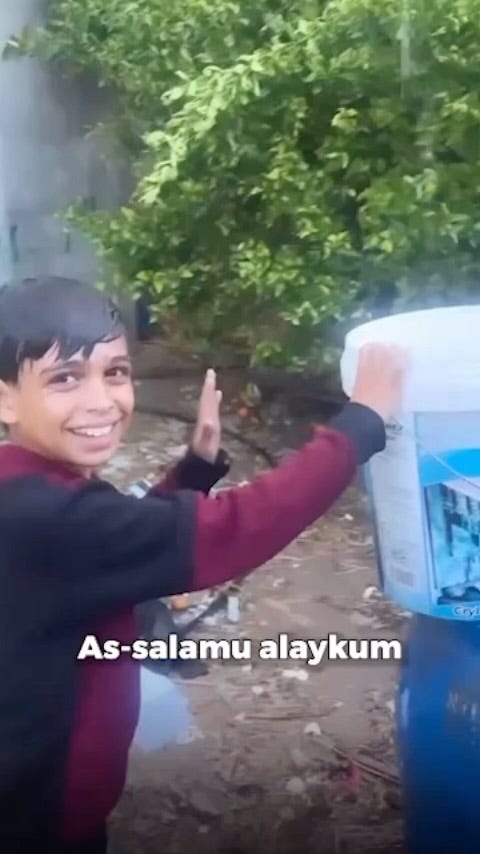Gratitude: Thanksgiving + Palestinians
Contemplating the story of Moses and the Israelites during the post-Egypt era to find genuine gratitude during seasons of simultaneous consumerism and international turmoil.

Thanksgiving, a holiday riddled with a problematic history, has its customs and traditions. As Americans, at the very least, we take advantage of the federal holiday to spend time with our family and loved ones. But also, it has grown into a season of consumerism—Black Friday and Cyber Monday.1 Fiscally outperforming the Christmas season,2 it is almost as if Thanksgiving, the holiday that touts itself for gratitude, has more to do with materialism than anything else. While we should interrogate all of our deeds and habits, it behooves us this year and right now when our Palestinian brothers and sisters get a mere 5-day ceasefire. We are grateful, but the war is yet to be over—not for them or us.
Gratitude in Islam is not exclusively a feeling and not something solely done with our hands; instead, gratitude is an internal and external action centered around Allah. Ibn Quddama (d. 620 /1223) mentions in Mukhtasr Minhaj Al-Qasidin that gratitude comprises the heart, tongue, and limbs. The gratitude of “the heart is where we intend good and harbor it for all of creation; as for the tongue, it is when we show our gratitude to Allah by praising him; and as for the limbs, means that we use Allah’s blessings in obedience to Him and abstain from relying on [his blessings] for sinfulness.”3 True gratitude necessitates and manifests in worship.

Allah ﷻ mentions shukr (gratitude) in the Quran on many different occurrences. One in particular that stands out is with Musa (alayhi salam) and the Israelites. After they had years of tremendous difficulty and torture by Pharoah in Egypt, Allah sent them Musa and (his brother) Haroon. Eventually, according to the famous Quranic (and biblical) narrative, they fled to the sea, and Allah commanded Moses, “Strike the rock with your staff the sea, and the sea was split (each part was like a huge mountain).”4 Allah relays to us, “Moses said to his people, ‘Remember Allah’s favor upon you when He rescued you from the people of Pharaoh.’”5 But, Allah doesn't stop there; he goes into depicting their conditions. “He rescued you from the people of Pharaoh who afflicted you with dreadful torment—slaughtering your sons and keeping your women. That was a severe test from your Lord.”6
Despite the tests Musa (alayhi salam) in his people persevere through, Allah commands them to be grateful. Our brothers and sisters in Palestine are being tortured and oppressed, and, with the amount of footage online, we are innocent bystanders. We insatiously watch and read with heavy hearts. We know it is real and do not even see the full scope of things. To make matters worse, there is such staunch juxtaposition between their conditions and the safety and security of our lives. Sometimes, it even leaves us feeling guilty, but none of this is happenstance. Allah—Al-Alim Al-Hakim Al-Khabir (the All Knowledgeable, All-Wise, and All-Aware)—chose us to be who we are, and where we are is due to very little control on our part. It is not something against us, but it requires showing our gratitude and thankfulness to Allah ﷻ for and with these blessings. Undoubtedly, as Allah told Musa and his people, this is a severe test by Allah ﷻ. The Palestinians have already answered their test. They have shown us their unimaginable faith, contentment, and gratitude. We, too, must be grateful. We have to ask ourselves, what will we do with our test?

In the next verse, Allah says, “If you are grateful, I will certainly give you more. But if you are ungrateful, surely My punishment is severe.’”7 We were given unique things for an individualized mission, regardless of whether we know particularities or specificities. How will we earn Allah's pleasure through the challenges we have in our personal lives? And the difficulty in the burdens, the heaviness that we feel in our chest for our brothers and sisters in Palestine, what are we going to do? Can we move beyond the materialism we see in the environment, stepping beyond just buying things or eating turkey with our families? While nothing is inherently wrong with either, we must not be shortsighted. Only through Allah’s mercy do we have everything—material and immaterial (e.g., safety and security, love and happiness, etc.)—in our possession, so how will we respond when we are questioned about it?
As the adage goes, “Rising tides raise all boats.” We believe in the ghayb (unseen), which obliges a spiritual component we all must play. Yes, we engage civically (e.g., call our senators, write letters, protest, etc.), but we cannot forget or underestimate the power of our dua for them and us. We have to look at the tremendous level of faith and conviction of the Palestinians and use it as motivation for our test. How can we use those videos we see, not just to numb our senses, another video, another picture, but something to remember Allah? Can we collectively raise our hands and make dua with our family and friends this weekend?
Habib Umar b. Hafiz recently said,
“Work together in righteousness and piety, send whatever aid you can—through turning to Allah, having a good intention, supplicating, donating, and so forth—, and wait for Allah’s aid and the goodness Allah brings.” Then he adds, “Make the most of this life so that you are of those who have the best deeds. [Allah says] “In order to test which of you is best in deeds. And He is Almight, All-Forgiving.”8
I was blessed to have my mother come to the house on Thursday. MashaAllah, She’s a very religious and spiritual person, and I am nothing but the benefactor of her dua and hard work. She raised my sister and me alone and sent me overseas to study. Over lunch said, “Abdul Malik, I don't understand what it is about the Palestinian people. How can they just exist like this and yet still smile? How is it that these people can have such profound faith? It's almost as if they don't have the same emotions we do.” She was referencing the viral video of a father holding his murdered daughter. Smiling, he said, “She was the soul of my life.” Then he lays her down to be buried with utmost contentment on his face.
We all have these questions. It would be bizarre if we did not. The profundity of these questions is leading non-Muslims to change their views on Islam and read the Quran to the point some have embraced Islam. Some benefits that came to mind I shared with my mom were two:
Experiential Theology
First and foremost, they are benefiting experientially from the blessings of Allah. They don't have to look far; you can see it in their children. They need water, Allah sent rain, and a young boy is recorded saying, “Al-Humdulillah, Allah provided us with rainwater.”9 When we turn the tap on, do we consider, “If your water were to sink into the earth, then who else could bring you flowing water?”10 There are innumerable of Allah’s favors we must open our hearts to see. I can write this article from my home, and you can read it wherever you are. That requires electricity, internet, stability, comfort (to both write and read), and things I am surely unaware of.
Rumi said, “The world’s forms are foam upon the Sea. If you are a man of purity, pass beyond the foam! His Beauty is the sun, His veil the world: But what does the picture see other than pictures and designs.”11 Our task is to look beyond the material to connect with something more profound, as Allah is Al-Khaliq Al-Raziq (The Creator and Sustainer). I elucidate more about this in the “Discursive Thoughts” in a previous article on Precence.
Community
They're together. Surviving and persevering through these difficulties arm in arm. While they may be displaced and have lost loved ones, no one is alone. Furthermore, they raised their children to know that this is their test by Allah. Who do we spend time with, and how do we speak to, our children? Is my community something I only engage with during Ramadan or on Fridays, or is it something that I'm sacrificing my comfort for—not only monetarily, but my time and energy? What do we do?
When I first saw this video of this father, it broke my heart because just the night before, I was playing with my daughters, who are similar in age. Al-Humdulillah, they are still with me, but it was a reality check. Instead of brushing them away, can I spend time with them when I want to do what I want to do? Can I take my situation to pour love into my children and raise them to be good Muslims to earn Allah's pleasure? Can I raise my children to be like the young boys who played in a mass graveyard and said, “This cemetery is ours; we will play in it, and we will be buried in it”?
The yaqeen (certainty) and contentment displayed by the Palestinians does not happen haphazardly. Our gratitude cannot be only on our lips but in our hearts and limbs. It has to be something more than saying “Al-Hamdulillah” when we get a bonus at work or something good happens to us, but can it be something we use equally in our bad times? So, as we are going after Thanksgiving, can we be thankful? Can we use the blessings that Allah has given us not only to eat food and spend time with family but also to show our genuine gratitude and worship? Can we challenge ourselves? Because Allah tells us in the Quran, “We have indeed established you on earth and provided you with a means of livelihood. Yet you seldom give any thanks.”12 Sustenance is not only food and drink but also support and motivation. So, watching these videos, can we also take spiritual and emotional sustenance from them? Can we use our emotions to submit to Allah and motivate actions?
Free Palestine!
And, ultimately, with Allah is all success!
Cyber Monday was created in 2005 to encourage online shopping after Black Friday. It has grown to the biggest online-shopping day of the year. See Pisani, Joseph. “Decades of Black Friday Deals: A History of America’s Favorite Shopping Day”. Wall Street Journal. Updated November 24, 2023. https://www.wsj.com/story/decades-of-black-friday-deals-a-history-of-americas-favorite-shopping-day-d471cc3d.
Handrinos, Nick, Brian McCarthy, Stephen Rogers, Lupine Skelly, and Kusum Manoj Raimalani. “2023 Deloitte holiday retail survey”. Deloitte. Accessed November 25, 2023. https://www2.deloitte.com/content/dam/insights/articles/us176694_cic_holiday-retail-survey/DI_2023-Deloitte-holiday-retail-survey.pdf.
IbnQudama Al-Maqdisi. Ahmad b. Abdul-Rahman. Mukhtasr Minhaj Al-Qasidin. Damascus, Syria: Maktabah Dar Al-Bayan, 1978. 277.
Quran 26:63.
Quran 14:6.
Ibid.
Quran 14:7.
Quran 67:2; “Take Part in Helping Palestine - Habib Umar Bin Hafiz (Allah bless and protect all our teachers)” YouTube. November 20, 2023.
Quran 67:30.
Chittick, William C. The Sufi Path of Love: The Spiritual Teachings of Rumi. Albany, NY: Sunny University of New York Press, 1983. 22.
Quran 7:10.




This was beautiful. One of my favorite lines is that "sustenance is not only food and drink but also support and motivation." I also see the way of your mother when she said, "It's almost as if they don't have the same emotions we do." Their faith is truly profound.
Very good article. In depth discussion about the gifts that God gives us and gratitude.